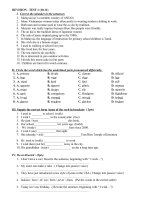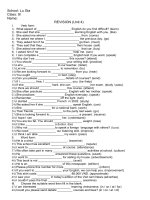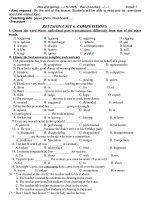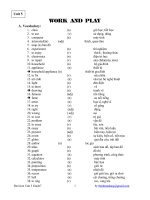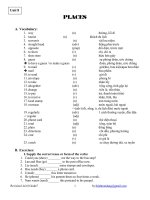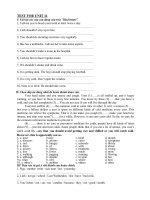REVISION UNIT 67 (GV)
Bạn đang xem bản rút gọn của tài liệu. Xem và tải ngay bản đầy đủ của tài liệu tại đây (142.48 KB, 8 trang )
REVISION 1 ( UNIT 6& 7)
I. Choose the best answer (3.5 ps)
6. The government has done a lot to _________ gender equality in education, employment
opportunities and healthcare.
A. promote
B. develop
C. satisfy
D. get
7. In the past, most parents had preference_________boys over girls.
A. to
B. for
C. against
D. in
8. In the past, the_________and engagement ceremonies took place one or two years before the
wedding.
A. suggestion
B. reception
C. marriage
D. proposal
10. “New York must be the most interesting city in the world, don't you think?”
“_________”
A. No, I'd rather do something else
B. Yes, I'd love to.
C. It might be. I don't know.
D. No, I don't like tall buildings.
11. These people wanted to start ________ new life in_________new country, but they faced a lot
of difficulties because they didn't know anything about_________new land.
A. a / the / a
B. the / a / the
C. X / a / the
D. a / a / the
12. Some people think that married women ________ pursue a career.
A. shouldn't
B. mustn't
C. might not
D. couldn't
14. They had _______ food and _______ warm homes for the winter, so they wanted to say thank
you to their native American friends.
A. a/the
B. X/X
C. the/X
D. X/the
15. She is playing ……. piano and her brother is playing …… football
A. the/ x
B. the/ the
C. a/ x
D. a/ a
16. She is having …… dinner. She often has ……. small dinner
A. x/ a
B. a/ a
C. the/ the
D. x/x
17. I bought …. English book yesterday. … book is really interesting
A. an/ the
B. the/ the
C. an/ a
D. an/ x
18. She is ……… teacher. She often goes to …school at 6 a.m
A. a/ the
B. a/ a
C. a/ x
D. the/ the
19. The monitor always gets to school on time to………….his classmates.
A. set good examples for (nêu gương)
B. take good examples for
C. give good examples to
D. create good examples among
20. Our teacher told us that all of our assignments must be written………….ink.
A. with
B. by
C. in
D. from
II. Write the second sentence so that it has a similar meaning to the first (2.5 ps)
1. Yesterday the temperature was nine degrees. Today it's only six degrees.
It's___________________________________________.
1. It’s colder today than it was yesterday.
2. They must not allow any kind of violence at school.
Any kind______________________________________.
2. Any kind of violence mustn’t be allowed at school
3. Many people believe that no sea in the world is warmer than the Red Sea.
Many people believe that_________________________.
3. Many people believe that the Red Sea is the warmest in the world.
4. They will sue the company for wage discrimination.
The company__________________________________.
4. The company will be sued for wage discrimination.
III: Read the text below and decide which answer A, B, C or D best fits each space.
Yesterday Eleaner Preston won an international swimming competition for girls (1) ………….
under sixteen. She swam faster (2) …………. girls from ten other countries. This (3)
………….even better when you learn that Eleanor is only thirteen. She had to have a special (4)
………….to enter because normally competitors are fourteen or older.
Eleanor has been (5) …………. on swimming for a long time (6) …………. she was three in
fact. I wonder whether she found it hard to (7) ………….several hours a day training. She (8)
………….me that sometimes she has problems finding time for homework, but that's all. "My
parents have given up so (9) ………….time driving me to local competitions, I think it's been
harder for them, actually." Her aim is to swim at the Olympic Games.
After yesterday's performance, I think she may (10) …………. there.
1. A. age
B. aged
C. ages
D. ageing
2. A. that
B. from
C. than
D. of
3. A. suggests
B. means
C. sounds
D. shows
4. A. permission
B. attention
C. opportunity
D. accommodation
5. A. happy
B. good
C. pleased
D. keen
6. A. until
B. since
C. when
D.ever
7. A. take
B. use
C.spend
D. pass
8. A. told
B. explained
C. said
D. agreed
9. A. often
B. much
C. long
D. many
10. A. reach
B. find
C. get
D. make
IV: Read the text and questions below. Mark the correct letter A, B, C or D for each question.
Not only does Linda Greenlaw do one of the most dangerous jobs in the world, but she also
does it extremely well. She has been described as "one of the best captains on the entire East coast"
and that, in one of the leading countries in fishing industry, is praise indeed.
Linda was born and brought up on Isle au Haut, a tiny island ten kilometers off the coast of
Maine, USA. She fell in love with fishing as a child, and she worked on fishing boats during her
summer breaks from college.
Her first opportunity to go on a deep-sea fishing trip came when she was nineteen. Alden
Leeman, a man she'd never met before hired her for thirty days on his sword fishing boat. The trip
was a success and eventually Alden offered Linda her first boat to captain in 1986, which probably
made her the only woman ever to captain a fishing boat. (thanh gươm- uy quyền)
So, why did she take up fishing in the first place? Linda says that not only does she like the
way she feels on a boat, but she also gets passionate about catching a fish. More than anything she's
proud of being a fisherman, even more so than she is of being a best selling author.
Linda has published four books to date, the first of which, The Hungry Ocean, was top of the
New York bestseller list for three months. In it, Linda tells the story of one fishing trip and narrates
the adventures she experienced on board with her five- man crew, including bad weather, sickness,
mechanical problems and, of course, the fish.
But the world of fish and fishing is a man's world and it's not easy to find a word to describe
Linda Greenlaw. In her own words, she says: "I am a woman. I am a fisherman not "a
fisherwoman", "fisherlady" or "fishergirl".
1. Linda is………….
A. American
B. British
C. Canadian
D. Hungarian
2. Her first-deep fishing trip was………….
A. when she was a child.
B. before she was twenty
C. in 1986
D. before she was nineteen.
3. Linda took up fishing because ………….
A. she needed to earn some money.
B. all her family are fishermen.
C. she loves boats and catching fish.
D. she fell in love with a fisherman.
4. On the boat described in The Hungry Ocean………….
A. there were six men
B. there four people
5.
C. there were five people
Linda prefers to be described as a………….
A. s fishwoman
B. a fisherlady
D. There were six people
C. a fisherman
D. a fishergirl
REVISION 2 ( UNIT 6& 7)
I. Find the word which has a different sound in the part underlined.
1. A. gender
B. enrol
C. preference
D. secondary
2. A. aware
B. family
C. planet
D. married
3. A. sue
B. spend
C. sure
D. pursue
II. Choose the word which has a different stress pattern from the others.
4. A. maintain
B. perform
C. prefer
D. offer
5. A. enrol
B. happen
C. pursue-2
D. affect
III.Choose the best answer A, B, C or D to complete the sentences.
8. In Yemen, women have less
to property ownership, credit, training and
employment.
A. possibility
B. way
C. use
D. access
10. International Women’s Day is an occasion to make more
towards achieving
gender equality.
A. movement
B. progress
C. improvement
D. development
11. Reducing gender
improves productivity and economic growth of a nation.
A. equality
B. inequality
C. possibility
D. rights
12. Women with high qualifications
to managers.
A. must promote
B. must be promotedC. must move
D. must be moved
15. True gender equality
when both men and women reach a balance between work
and family.
A. can achieve
B. should be achieved C. can be achieved D. should achieve
IV. Read the passage carefully and choose the correct answer
In the past, both men and women were expected to be married at quite young ages. Marriages
were generally arranged by parents and family, with their children having little chance to say no in
the matter. In the past it was not surprising to find that a bride and groom had only just met on the
day of their engagement or marriage.
In modem Vietnam, this has changed completely as people choose their own marriage-partners
based on love, and in consideration primarily to their own needs and wants. Moreover early
marriage is quite illegal.
The traditional Vietnamese wedding is one of the most important of traditional Vietnamese
occasions. Regardless of westernization, many of the age-old customs practiced in a traditional
Vietnamese wedding continue to be celebrated by both Vietnamese in Vietnam and overseas, often
combining both western and eastern elements. Besides the wedding ceremony, there is also an
engagement ceremony which takes place usually half a year or so before the wedding. Due to the
spiritual nature of the occasion, the date and time of the marriage ceremony are decided in advance
by a fortune teller. The traditional Vietnamese wedding consists of an extensive array of
ceremonies: the first is the ceremony to ask permission to receive the bride, the second is the
procession to receive the bride (along with the ancestor ceremony at her house), the third is to bring
the bride to the groom's house for another ancestor ceremony and to welcome her into the family,
then the last is a wedding banquet. The number of guests in attendance at these banquets is huge,
usually in the hundreds. Several special dishes are served. Guests are expected to bring gifts, often
money, which the groom and bride at one point in the banquet will go from table to table collecting.
1. In the past,_________.
A. Vietnamese couples were free to make a decision on the marriage
B. Vietnamese marriage was decided by parents and family
C. getting married at an early age was not allowed
D. parents had no right to interfere their children's marriage
2. In former days, the fact that a bride and groom had only first met just on the day of_________.
their engagement or marriage was
.
A. surprising
B. popular
C. uncommon
D. strange
3. Which sentence is referred Vietnamese modem marriage?
A. Most young people do not have their marriage based on love.
B. All marriages are arranged by parents and family.
C. Marriage is quite westernization.
D. Couples do not get married at quite young ages.
4. According to the passage, _________.
A. Oversea Vietnamese people do not like to organize a traditional wedding
B. There is an engagement ceremony which takes place usually half a year or so before the
wedding
C. Many of the age-old customs practiced in a traditional Vietnamese wedding do not exist
nowadays
D. Vietnamese people never ask a fortune teller the date and time of the marriage ceremony
5. Which does not exist in a Vietnamese wedding party?
A. firecrackers B. guests C. dishes D. gifts
V. Choose the word or phrase among A, B, C or D that best fits the blank space in the
following passage.
An advocate for Kenyan women and environment
Wangari Maathai has become an international (26)
because of her persistence in the
struggle for democracy, human rights and environmental conservation. Maathai is best known for
her efforts to develop the Green Belt Movement, an organization that focuses on planting trees to
protect the environment and improve the (27)
of life. Because of her efforts, Maathai was
(28)
the Nobel Peace Prize in 2004.
In 1976, Wangari Maathai became active in the National Council of
Women of Kenya. While she was serving as the chairwoman in the National
Council of Women, she began to found an organization that encouraged
women’s groups to plant trees in order to conserve the environment. It was
this small effort that has (29)
women in planting more than
20 million trees on farms, schools, and churches. This effort eventually
became known (30)
the charitable organization (31)
the Green Belt Movement.
Wangari Maathai has become very important to the people of Kenya, Africa and the
international (32)
. Because of her active role in the environment and the Green Belt
Movement, more than 20 million trees have been planted, numerous other countries have begun tree
planting programmes, and women all over the world have been helped by the example that she (33)
. As noted (nổi danh. Có danh tiếng) by the Norwegian/no:widzơn- ng na uy) Nobel
Committee, she has served as an “(34)
for many in the fight for democratic rights and
has especially encouraged women to (35)
their situation.”
26. A. image
B. key
C. figure
D. idol
27. A. quality
B. quantity
C. characteristic
D. feature
28. A. given
B. awarded
C. rewarded
D. gained
Award (n)= prize (giải thưởng, phần thưởng được trao trong các cuộc thi, cho các thành tích xuất
sắc của một cá nhân hay tổ chức, thường dưới dạng huy chương, danh hiệu, giấy chứng nhận và
được công bố rộng rãi
Award thường đi kèm t
Reward (n) = compensation (n)/ insentive : sự động viên, khích lệ, đền bù, thưởng cho đã làm việc
tốt như một thứ để ghi nhận cho nỗ lực, hay sự hoàn thành tốt của bạn
29. A. resulted
B. offered
C. provided
D. assisted
30. A. as
B. for
C. in
D. Ø
31. A. call
B. calling
C. called
D. called as
32. A. community
B. society
C. association
D. federation
33. A. fixes
B. sets
C. puts
D. establishes
34. A. feeling
B. emotion
C. impression
D. inspiration
35. A. take
B. move
C. better
D. gain
VI. Read the passage, and choose the correct answer A, B, C or D for each question.
The status of women in Japan is complex and cannot be characterized in simple terms. Slowly,
there are a growing number of professional women and professional women's associations. More
women continue to work after getting married and having children. However, many companies have
separate programmes for women, usually non-career development, and follow practices that would
be considered discriminatory in other societies. For a typical couple, the female spouse is still
generally expected to do all of the cleaning, cooking, and other chores, whether she is working or
not. Single women are said to be enjoying their lives, spending much money on travel abroad and
shopping. Housewives are active in networking themselves for various objectives, for example
volunteer activities, community services, recycling activities, study groups, and many others. The
traditional Japanese value of “good wife, good mother’ is changing.
Unlike other countries where a couple is the usual social unit, in Japan it is typical for only the
husband to be invited to business gatherings or to weddings for company employees. Exceptions are
frequently made for foreign visitors depending on the occasion, but wives should not take their
exclusion (sự loài trừ, sự bỏ ngoài cuộc) as a personal insult (sự lăng mạ-in’sănt/. (các bà nội trợ
ko nên xem việc họ bỏ mình ra ngồi cuộc chơi như là sự lăng mạ với cá nhân )
36. The status of women in Japan is
.
A. indefinite and illegal
B. complex and unclear
C. clear and high
D. low and simple
37. Nowadays. Japanese women
.
A. can go to work after getting married and having children
B. all have become professional women
C. take over most important work in many companies
D. have the same work and pay as men in all companies
38. In the family, the female partner
.
A. often does all the housework if she doesn’t go to work
B. the male spouse always helps his wife with cooking and other chores
C. is still generally expected to do all of the housework
D. no longer spends much time doing the housework
39. Which of the following sentences is NOT true according to the passage?
A. It is normal for only the husband to be invited to business gatherings.
B. Single Japanese women are used to enjoying their lives, spending much money on travel abroad
and shopping.
C. The traditional Japanese value of “good wife, good mother” is changing.
D. Wives in Japan can take their exclusion as a personal insult.
40. What can be inferred from the passage is
.
A. the role of Japanese women in the society is changing so that all Japanese women gain gender
equality in both society and home
B. there have been some changes in their social role but Japanese women haven’t acquired the
same rights as men in many fields yet
C. Japanese women are fighting for their definite status in the society
D. most Japanese women are satisfied with their social role nowadays
I.
2.
3.
II.
REVISION 3 ( UNIT 6& 7)
Find the word which has a different sound in the part underlined.
A. female
B. parent
C. baby
D. age
A. birth
B. other
C. youth
D. think
Choose the word which has a different stress pattern from the others.
4. A. college
B. woman
C. mistake-2
D. housework
5. A. hunger
B. police-2
C. parent
D. courage
III.Choose the best answer A, B, C or D to complete the sentences.
6. In Australia, men and women will be given an equal
to contribute both at home and
in the workplace.
A. luck
B. risk
C. chance
D. pay
7. In Nepal, child marriage and
to school have prevented girls from reaching their full
potential.
A. lack
B. access
C. lack of access
D. access lack
9. Women in the United States are more likely to complete high school and college than men, but
there are
in high government positions.
A. a few women
B. a number of women
C. many women
D. fewer women
10. Women and men must have equal
to shape society and their own lives.
A. directions
B. ways
C. behaviours
D. rights
11. Women do the majority of domestic and
work, including cleaning, cooking, and child
care as well as taking care of sick and elderly.
A. paid
B. unpaid
C. low-paid
D. well-paid
13. Gender equality
without the support of the government, organizations, and individuals
A. mustn’t be achieved
B. needn’t be achieved
C. should not be achieved
D. cannot be achieved
14. Although progress
, we are still a long way from achieving gender equality
worldwide.
A. has been made
B. have been made C. has been done
D. have been done
15. In sub-Saharan African countries, investments
in education, skill training and health
care to form a better future for adolescent girls and their families.
A. will be needed
B. should need
C. will not be needed D. must need
IV. Choose the word or phrase among A, B, C or D that best fits the blank space in the
following passage.
Saudi Women Register To Vote For The First Time
Women in Saudi Arabia began registering to vote this week for the first time in the nation’s (26)
. The late King Abdullah announced in November, 2015 that women would be allowed to
run for office and vote in city elections, which (27)
every four years. At least 70 women
intend to run for office, and more than 80 registered as campaign managers, Arab News reported
last month. (28)
the legal barrier to voting has been lifted (rỡ bỏ, chấm dứt), other
Saudi laws and culture could complicate women’s (29)
to cast their votes.
Saudi women still have to deal with limits on their freedom of movement, and since it’s illegal
for them to drive, many of them will have to (30)
male members of their family to take
them to register and to vote. Male relatives who oppose female voting rights could also be a barrier.
The government also (31)
voters to have personal ID cards, and many Saudi women do
not.
To make serious (32)
on women’s rights, Saudi authorities should (33)
the male
guardianship/ga:diơnship- giám hộ) system, under which caring policies and practices (tập tục, tập
quán) (34)
women from obtaining a passport, marrying, traveling, or accessing higher
education without the approval of a male guardian. Only then will Saudi Arabia's women be able to
(35)
to society on an equal situation with men.
26. A. life
B. history
C. campaign
D. period
27. A. take place
B. take part
C. take care
D. take after
28. A. When
B. Because
C. However
D. While
29. A. work
B. careers
C. efforts
D. travels
30. A. trust
B. remain
C. base on
D. rely on
31. A. needs
B. keeps
C. requests
D. requires
32. A. development
B. steps
C. progress
D. movement
33. A. cut
B. stop
C. complete
D. finish
34. A. prevent
B. take
C. end
D. remove
35. A. help
B. contribute
C. cause
D. give
V. Read the passage, and choose the correct answer A, B, C or D for each question.
Tawakkol Karman was awarded the Nobel Peace Prize in 2011 in recognition of her work in
non-violent struggle for the safety of women and for women’s rights to full participation in Yemen.
Tawakkol was born in 1979 in Taiz, Yemen’s third largest city. She studied a degree in
Commerce from the University of Science and Technology in Sana’a before completing another
degree in Political Science from the University of Sana’a.
Growing up in a country with political uncertainty, Tawakkol witnessed the
unification of North and South Yemen in 1990, followed by a civil war in 1994
in which the North gained victory over the South.
As a journalist and human rights activist, Tawakkol responded to the
political instability and human rights abuses in Yemen by organizing others and
reporting injustices. In 2005, she founded the organization Women Journalists
Without Chains (chuỗi hạt, dậy xích, xiềng xích) (WJWC) which supports rights
and freedoms and provides media skills to journalists. In addition, the
organization releases regular reports in human rights abuses in Yemen,
recording more than 50 cases of attacks and unfair sentences against
newspapers and writers so far.
In 2007, Tawakkol began organizing weekly protests in Yemen’s capital, Sana’a, aiming at
calling for inquiries (cuộc điều tra, thẩm vấn) into social and legal injustice (sự thiếu công
bằng-/in’dzătik-). Tawakkol’s weekly protests continued until 2011 when she redirected protesters
(người kháng nghị- người phản đối) to support the Arab Spring. Tawakkol even brought Yemen’s
revolution to New York speaking directly with UN Secretary General Ban Ki-Moon and organizing
public meetings at the UN headquarters.
Brave and outspoken (thẳng thắn, trực tính), Tawakkol has been imprisoned on a number of
occasions for her opposition movement for human rights. She is known as “Mother of the
Revolution”, and “The Iron Woman”.
Since receiving the Nobel Peace Prize, she has continued to support female journalists and
encouraged people in Yemen to ask for social justice and human rights. Fiercely (dữ dội, mãnh liệt)
committed (tận tụy,) to change, Tawakkol spends the majority of her time in a tent in Change
Square, where she continues her peaceful protest /prơtest- sự phảnđối, phản kháng) for justice and
freedom.
36. By establishing WJWC, Tawakkol would like
.
A. to oppose to the victory of the government from the North
B. to support rights and freedom and provide media skill to journalists
C. to start the non-violent struggle for the safety of women and for women’s rights
D. to report the unification of North and South Yemen and the civil war
37. The organization WJWC produces regular reports on
.
A. bad sentences in newspaper articles issued in Yemen
B. weekly protests in Yemen’s capital and the government’s repression
C. violent and unfair treatments against humans especially journalists
D. organizing public meetings at the United Nations headquarter
38. The purpose of weekly protests in Yemen’s capital led by Tawakkol from 2007 to 2011 was
.
A. to ask to make speeches at the United Nations headquarters
B. to bring Yemen’s revolution to New York and speak to UN Secretary General
C. to get many women free from prisons on a number of occasions
D. to oppose to social and legal injustice and wrongdoings from the government
39. All of the following are true about Tawakkol EXCEPT that
A. she has started supporting female journalists since 2011
B. she was awarded the Nobel Peace Prize in 2011
C. she started supporting the Arab Spring in 2011
D. she has been put in prison several times
40. The word “committed" in the last paragraph is closest in meaning to
A. done something illegal or something that is considered wrong
B. determined to give your loyalty, time to a particular principle
C. sent officially to prison or hospital
D. being brave and outspoken to live in very bad conditions
.
.




